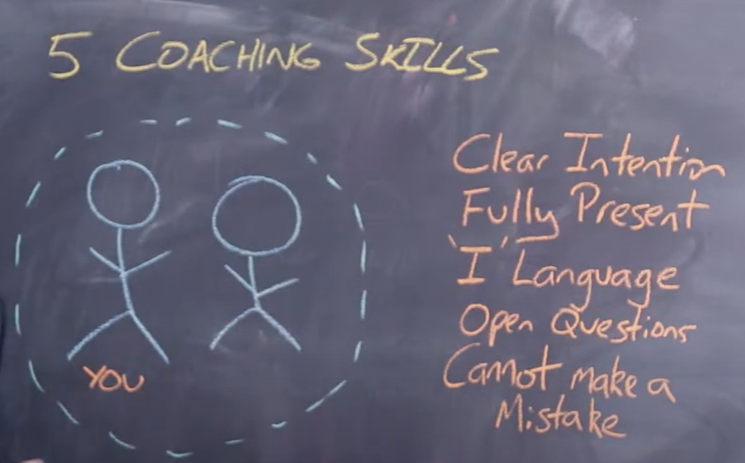My Birthday Month Begins
DATELINE: Brisbane, Australia
(Side Note: With the US Election next week, a few people have asked about the Presidential Election murder mystery novel I wrote back in 2004. If you want to have a read The Cookie From The Cookie Jar is available as a PDF download on my website here).
Over the past 20 years I’ve trained and mentored well over 100 business coaches, consultants, and speciality advisors. So when it comes to “Coaching Skills”, I know the deep nuances and the benefits.
Most of my clients are also now aware that “Coaching Skills” are an essential part of the modern leader’s toolkit. Only a few weeks ago I was talking about “Founder Mode” for small business owners … and how “Coach, Don’t Play” is one of 3 essential criteria.
You probably don’t need the deep cut version of coaching skills (but hit Reply if you’d like to join my Coaching Skills workshops one day).
But how about some Simple Coaching Skills, the sort you can readily apply on a daily basis as a leader? Well that’s the topic of this week’s newsletter and video. Enjoy!
Blackboard Fridays Episode #87 – 5 Coaching Skills for Any Leader
Increasingly in business, being a coach is seen as an essential management or leadership skill. Indeed there are very few business owners these days who don’t on some level recognize that they need to act as a coach for their team. Understanding what that actually means and how to be a coach is a much, much different conversation.
Today on Blackboard Fridays, I thought I would share five simple coaching tips and tools that any business leader can apply. So let’s start by having a look at the diagram, we can see that you’re here, and here is, say one of your team members.

They’re working for you, but at the same time, you have this relationship where you’re coaching them in their own personal development and as they’re going through their own employee empowerment journey. If you get a coaching opportunity with them, whether that’s brief or whether that’s a formal, regular part of your one-on-ones, there are five skills that I would encourage you to work on, practice and apply.
1. Start with Clear Intentions
Presence is a skill that does take some practice. I’d encourage you (if you’re not already) to look at some form of mindfulness or meditation in your daily routine to help you develop this skill. At its simplest, presence is about making sure that your head chatter is not impacting the conversation that you’re having.

It’s very easy, as a business leader with that infinite to-do list that we all have, to be thinking about that email I’ve got a reply to, that client that’s having an issue at the moment, that growth strategy I’d really rather be working on even though I’m having this conversation with a team member.
You’ve got to get rid of that head chatter in order to be present. And then truly to be present, you need to be listening with your whole body. And go back and look at episode 54 if you want help to break down the thinking, the feeling, and the knowing, those three different ways that we engage and process information, and communicate with people.
To understand that when you’ve those three aligned, and you’re present, then you’re going to be bringing all of yourself to that coaching conversation. And as a result, delivering a lot more value to the team member.
2. Be Fully Present
Using ‘I’ language as opposed to ‘You’ language. Now this is a little bit tricky for a lot of business leaders because we’re used to giving directions, delegating and managing people. Importantly, when it shows up, this comes around because sometimes using ‘you’ language can be confrontational.
Remember back to the episode where we talked about filters, the fact that we all see the world in different ways. So what you’re hearing is not necessarily what your team member is sharing. So if you say you are having this problem, you may find that the team member doesn’t understand that that’s not what they were saying, and you start to lose that conversation.
The ‘I’ language in that situation would be “I hear you saying this’“. Taking responsibility for what you’re hearing helps empower that team member to communicate better if what they’re saying is not coming through to you. Or to agree with you and then you can proceed to help. So whenever you find yourself saying ‘you’, consider saying ‘I’ instead, and see if that improves the conversation.
3. “I” Instead of “You”
Four, which is a critical part of coaching, is asking open questions as opposed to closed questions which just have a yes or a no answer. Being aware that you’re there to ask the open questions such as what could you do about this? what did you feel in that situation? what do you see as the solution? stops you from coming in with your idea of what the solution needs to be.
By all means, if you want to have a manager relationship with the team member, tell them what to do. If you want to have a coaching relationship, you need to ask the open questions to get that team member to that point on their own. And that’s so much more powerful for them ongoing.
4. Asking the Right Kind of Questions
Four, which is a critical part of coaching, is asking open questions as opposed to closed questions which just have a yes or a no answer. Being aware that you’re there to ask the open questions such as what could you do about this? What did you feel in that situation? What do you see as the solution? Stops you from coming in with your idea of what the solution needs to be.
By all means, if you want to have a manager relationship with the team member, tell them what to do. If you want to have a coaching relationship, you need to ask the open questions to get that team member to that point on their own. And that’s so much more powerful for them ongoing.
5. There’s No Such Thing As A Stupid Question
Lastly, point five, which I find in my experience working with a lot of different business leaders is the one that stops them from embracing the coaching opportunity the most. Appreciate that in a coaching relationship you cannot make a mistake.

Don’t get caught up in worrying that you’re going to say the wrong thing, or ask a stupid question. Trust your instincts, ask the question that pops up into your head. And I do this, after 12 years of coaching.
I’ll be sitting there, one-on-one with a client, or even coaching a team, and something will jump into my head and I will have no idea why that’s an important question but I will trust my instincts, I will know that I cannot make a mistake and I will ask that question.
Often, it’s only afterwards, after I get an answer or further into the conversation that I realize just how powerful and insightful that question was. Trust your instincts, recognize that you can’t make a mistake. And embrace the opportunity to be a coach rather than just someone who delegates and tells. Practice does make perfect, with these skills, you can have perfect practice.
With Love,
Jacob Aldridge
International Business Advisor
WhatsApp +61 427 151 181
Visit my website
Connect on LinkedIn




